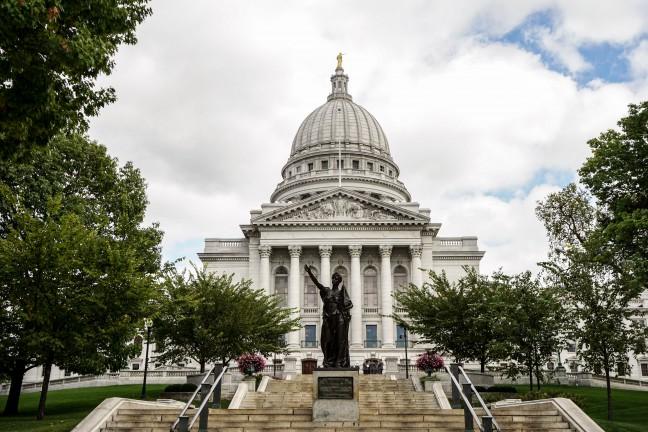A Democratic bill that would regulate campaign coordination between candidates and independent groups aims to decrease corruption, but experts say it may not pass a Republican majority Legislature.
The bill, which Rep. Chris Taylor, D-Madison, and other Democrat legislators will introduce next year, would block candidates from engaging in campaign coordination.
Campaign coordination occurs when candidates engage with independent groups in a way that encourages the group to endorse the candidate. Rep. Katrina Shankland, D-Stevens Point, said Taylor’s bill would change the law so that independent groups would decide if they want to endorse a candidate on their own, without the candidate’s involvement in the decision making process.
The bill was drafted in response to Wisconsin Supreme Court’s ruling on Gov. Scott Walker’s John Doe investigation. While running in the 2016 presidential election, Walker raised millions for the 527 organization called Wisconsin Club For Growth, which then financially benefitted from these funds and also used them to propel Walker’s campaign forward, said Robert Kraig, executive director of Citizen Action of Wisconsin.
There are limits on how much money a candidate can spend on their campaign that Walker was able to bypass by coordinating with Wisconsin Club For Growth and allowing it to technically campaign for him, Kraig said.
A 527 organization uses issue advocacy to raise awareness on political or social issues without specifying which candidate they support, University of Wisconsin political science professor Barry Burden said. These kinds of organizations can influence the election of candidates in all levels of government through advertisements that focus on topics like climate change and abortion. While the ads do not specify candidates, the stances they present can imply which candidate the organization wants the public to support or oppose, Burden said.
But few people check issue ads to see if they contain language supporting or going against a candidate, which can make them seem biased, Burden said.
Moreover, the Wisconsin Supreme Court ruled that the First Amendment protects coordination between candidates and independent groups in 2015. To prevent candidates from exploiting issue ads to advocate for them, Taylor’s bill will not only ban issue ads but also the use of words similar to “vote for” and “vote against.”
The bill would also mandate that any group or person spending more than $1,000 disclose donation information, Burden said.
Kraig said Democrat legislators also believe this will lessen the influence money and corporations have on American elections.
But Kraig said the likelihood that this bill would be able to ban issue ads or prevent people from coordinating with issue ads is low. It is, however, possible to mandate that such coordination is public, he said.
“Such issue ads will become much less useful to candidates when you make [public information on issue ads] possible,” Kraig said. “There will be issue ads of some form regardless, but they have to be public and … not coordinated with candidates or campaigns to prevent a completely corrupt system.”
Kraig said he believes campaign coordination is bribery and the state Supreme Court’s ruling is “a distortion” of the First Amendment. He said that politicians giving money to organizations and vice-versa could lead to each having stronger influences on each other’s affairs.
Shankland said it is “high time” that such a bill is introduced. She said the bill would enact comprehensive campaign finance reform that would prevent candidates and organizations from pursuing their own interests. Democrats believe mainly Republican candidates engage in such illicit coordination.
“Elected officials should be accountable to their voters, not to big-money campaign donors,” Shankland said.
But Kraig said even Democrat legislators can use issue ads and coordinate with organizations so that organizations campaign in their favor. He said the Wisconsin Supreme Court needs to set new precedents that are hard to overturn because “good government action should be bipartisan.”
While President-elect Donald Trump has shown some interest in regulating how lobbyists for this issue should be approached on the national level, it is not expected that there will be quick action with a larger majority of Republicans in Congress, Burden said.
As the bill has not yet been discussed in the state Legislature, Rep. Scott Allen, R-Waukesha, said he was not familiar with the bill nor this issue. But he said he believes the chances of such a bill passing through a Republican majority are very slim.
Spokespeople for Rep. John Nygren, R-Marinette, and Rep. Paul Tittl, R-Manitowoc, also said they weren’t familiar with the bill and did not wish to comment.
Burden said the bill would be “lucky to get a hearing” because Republican legislators have their own set method for coordinating campaigns.
The bill will be introduced January 2017.


